Anime Review: Rising of the Shield Hero
- Joseph Lutholtz
- Aug 7, 2019
- 10 min read

Alternate Names: Tate no Yuusha no Nariagari
Score: 7/10, 4/5
Length: 25 Episodes
Genre: Isekai, Action, Adventure, Drama, Fantasy, Shounen
Summary: Threatened by the calamitous, monster-summoning Waves, the nation of Melromarc calls on the aid of the Four Cardinal Heroes from another world. Gifted with a magical sword, spear, bow, or shield, the Cardinal Heroes are meant to avert the calamities and keep their new world safe. Gifted with the Cardinal Shield, Iwatani Naofumi instantly finds himself at a disadvantage though. He cannot attack and must rely on others to be his sword. What's worse, the very country that summoned him already holds a deep hatred of the Shield Hero and intends to deny him every opportunity to succeed in this world. Betrayed by his only party member and accused of a crime he didn't commit, Naofumi is forced to throw away all human decency just to survive. Yet, through his struggles and his newfound kinship with the downtrodden, Naofumi might still prove to be the greatest hero this world has ever known.
Review: As most of you know by this point, I prefer shows that get me thinking. Even if the ideas and narratives at play are simple and repetitive, thoughtful shows give me something to engage with and appreciate on the same level most other people appreciate simplicity. Particularly if a show can manage to use its ideas and narrative to offer a message, that is almost always a guaranteed way for a show to end up a personal favorite of mine. Of course, I'm not so deluded as to believe that this level of thought should be a standard of the industry; that just wouldn't be feasible. After all, I'm just as inclined to love slice of life comedies, wholesome romances, and cathartic action titles as I am my brain food. More to the point, though, I know such a desire would be unfeasible because there are too many shows out there that would suffer under that kind of scrutiny. If you think too hard or put in too much effort to pick things apart, shows like Rising of the Shield Hero become almost impossible to enjoy. If you spend too much time weighing a show's actions against realistic standards or restricting it to mundane logic, shows like this will only cause you unnecessary aggravation and stress. That obviously doesn't mean we shouldn't criticize shows for baiting disgusted social responses and fetishizing abhorrent actions--looking at you Goblin Slayer--but I feel like there does need to be a balance between engaging with shows as social commentary and enjoying them as entertainment. I feel like there needs to be a general understanding that it's perfectly alright to enjoy a show even if it is conceptually problematic. After all, despite my myriad complaints with Shield Hero's characters and concepts, I still managed to enjoy it to some degree.

It definitely took some time for the show's quality to shine through those problems though.
The task of appreciating Shield Hero starts with one thing: the acknowledgement that this is a simple show with a very basic understanding of how character drama and development work. When this series wants to make you hate something, it digs up the most vile garbage you can manage. When it makes you want to like a character, it turns them into the most vulnerable, pitiable creature you've ever seen. In this manner, the show builds itself on maintaining a sense of catharsis. Namely, once you see all the horrible shit the series' main protagonist, Iwatani Naofumi, goes through, you'll want to cheer for him that much harder. That foundation obviously means that the series relies on some heavy-handedness and a certain willingness to just go with the flow. Fail to accept the series' almost juvenile understanding of drama or spend too much time picking nits and this show simply will not be an enjoyable experience; trust me on this. Let's take, for example, the show's first big sticking point for most people, the first couple of episodes. In the beginning, we are introduced to Naofumi and the other Cardinal Heroes who have been isekai-ed into the fantasy kingdom of Melromarc to battle the Waves of monsters that attack this world. Instantly, we are made to understand that these characters perceive this world the same way something like Sword Art Online is supposed to work. For them, it's a fully immersive MMO full of fantasy tropes, stat bars, and a hud that helps them interact with the world and its people.
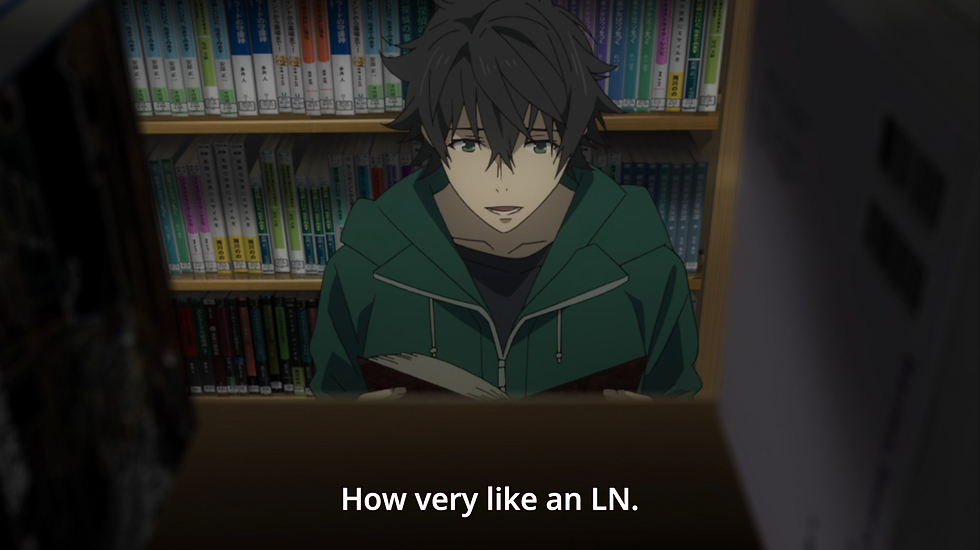
Oh, I forgot to mention that you the show's comedy is incredibly on the nose as well.
Yet, for Naofumi, things are instantly made a lot harder for him than they are for the other Cardinal Heroes. Where they are each given either a sword, a spear, or a bow, Naofumi is given a shield that makes it impossible for him to attack anything. Do to class-like restrictions, he can't even pick up a spare sword and use that; all he's got is a solid tool for defense. Because of this arbitrary restriction, he is immediately humbled into relying on others to help him gain XP whereas the other heroes are entirely self-sufficient. Since the series' cathartic action needs even more drama than that, though, Naofumi is automatically and categorically made into a victim of not just the system but the nation that summoned him. As if being a support class hero wasn't demeaning enough, the single party member he's given ends up betraying him as part of a national conspiracy to undermine the efforts of or outright kill the "useless" Shield Hero. Accused of abusing his status as a Cardinal Hero and raping his party member in front of a rigged delegation of nobles, Naofumi instantly becomes reviled by his fellow Heroes and the nation at large. Of course, all of this is all the more galling for Naofumi who prided himself on being the responsible gentleman and refused to let himself feel entitled to his party member's affections. So, just like that, Naofumi is ostracized as a monster, barred from the opportunities afforded to the other heroes, and is forced to sink to new lows just to survive.
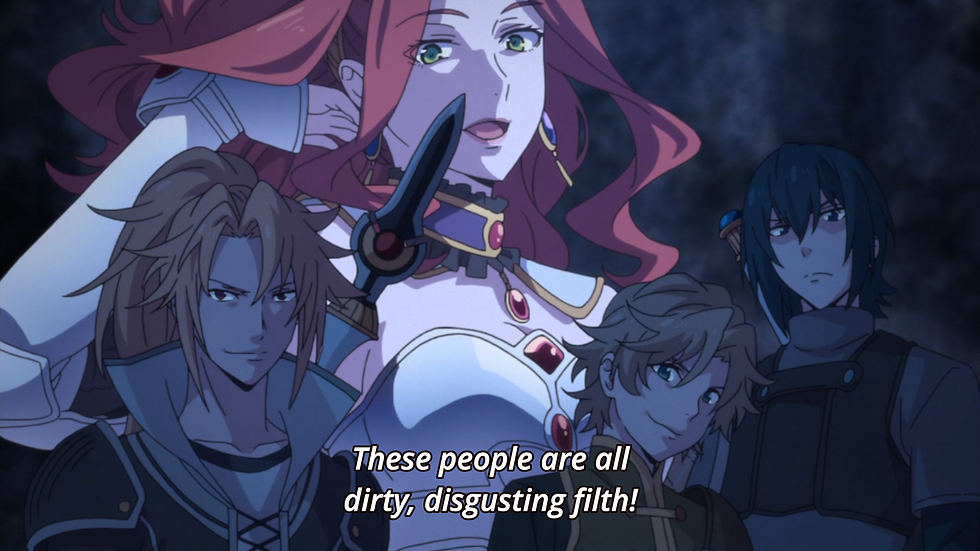
You can just feel the edge.
With this dump of heavy-handed drama, the series sets everything up to make Naofumi's eventual successes that much more satisfying. Yet, almost immediately after this ham-fisted drama has run its course, Shield Hero actually starts to resolve into something much more palatable. Even though Naofumi buys a slave girl goes so far as to spout lines about how "slaves aren't people" and how she'll be nothing more than a tool to him, he immediately does a 180 and acts like an actual hero. Immediately after purchasing her, Naofumi starts caring for and looking after Raphtalia. Once he sees how bad off she is in comparison to him, he makes to effort to cure her afflictions, both physical and mental, and strives to give her a purpose. Namely, while she fights at his side, she'll be able to save other people from the suffering she endured before becoming Naofumi's slave. Then, just like that, Naofumi manages to build the beginnings of a party that's grounded in his capacity to be a good person, rather than his hatred for Melromarc or sheer desperation.
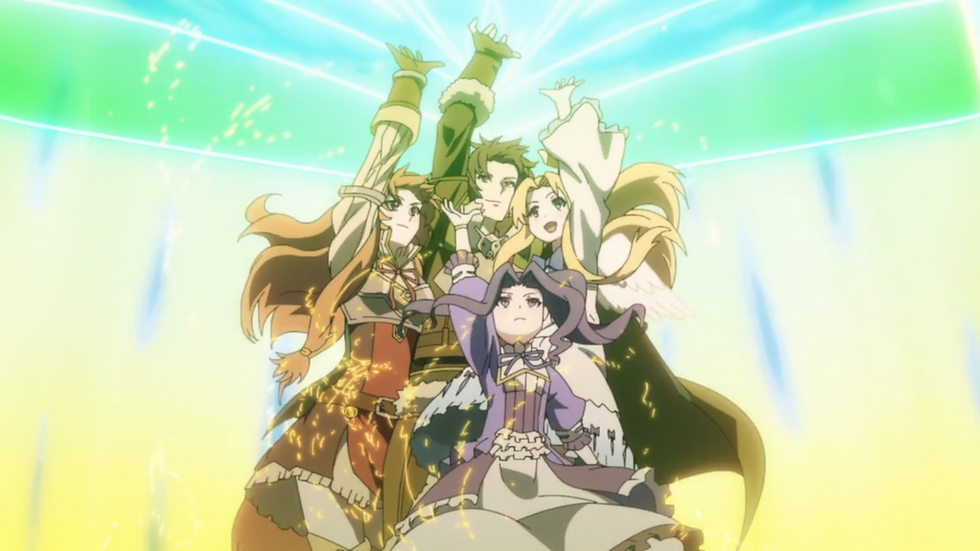
It is that goodness, then, that will ultimately save both this world and Naofumi from their suffering.
It is that capacity for goodness that proves to be the heart of this show's quality. Specifically, as the series, goes on we get to see Naofumi grow into the hero this world needs both in spite of his initial hatred for this world and because of it. Through his trial by fire and humiliation, he comes out of it that much stronger and with a level of detached skepticism that protects himself and others from the machinations of people like Melromarc's king and princess. More importantly, though, his being beaten and degraded turns his capacity to be a good person into a personal calling to help the helpless and save the downtrodden from their misery. As he travels the world, both a desire to flee Melrocarc's capital and the need to earn the coin that'll help him succeed, Naofumi sees villages and people whose lives have been ruined by either the abuses of Melromarc's royalty, the horrors of the Waves, or the sheer incompetence of the other Cardinal Heroes and he does what he can to help. This, of course, puts him further at odds with Melromarc's royalty and his fellow heroes, making him a repeated target for yet more heavy-handed drama, but he still manages to pick himself up and learn from his enemy's schemes.
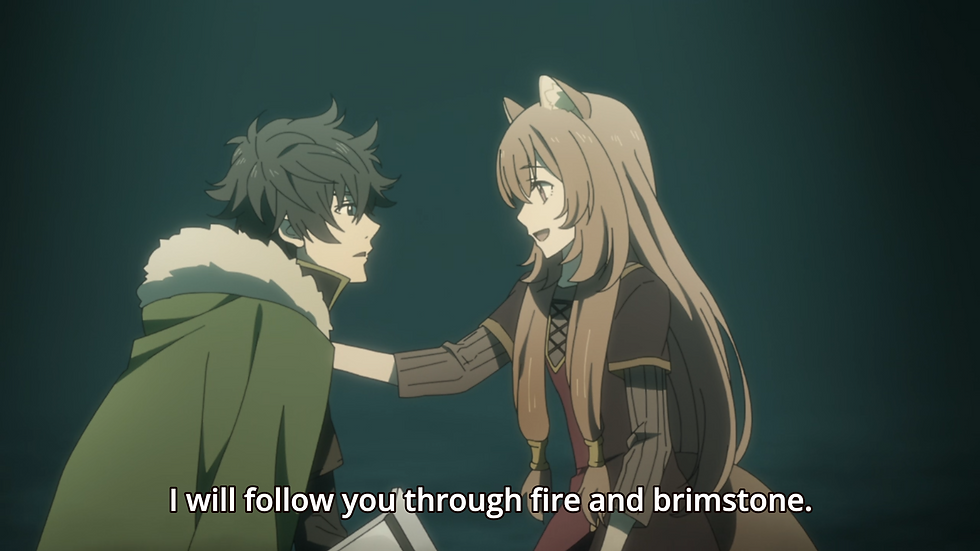
Of course, a good part of the reason he's able to succeed is because he has loyal and
dedicated friends who will go out of their to help him like he helped them.
Toward the end of the series, though, things take an interesting turn that not only helps Naofumi grow as a hero but shows an odd kind of thoughtfulness that speaks to a higher level of quality than what we see in the show's first cour. It's still a show that strongly relies on cheap gimmicks and leans on the standard isekai tropes that make it impossible to believe that anything is ever actually at state. Yet, as things start to wind up for the show's finale, a lot of the show's initial ideas start to follow a line of thought uncommon in most isekai. Namely, the series starts to move away from the idea that Naofumi might be the cure to all of this world's problems. He's still very much the crux of the story and its central character but the plot starts to make Naofumi consider how he might better serve this world, rather than just be its hero. Through what starts as some weird moments of homesickness to a mandate from the Cardinal Heroes that came before his generation, Naofumi starts to actually work help this world become a better, more self-reliant place. He starts to consider not only how he might help this world learn to not depend on him and his fellow heroes but he also starts working to rebuild a connection to the other heroes so that they might also be more prepared for the harder fights that are to come. While this still feeds into the catharsis of Naofumi overcoming and outwitting the machinations of those who abused him, it also shows a considerable amount of growth and maturity in Naofumi's character. Forced as it might be, it's a kind of growth that is rarely seen in the isekai genre and a welcome deviation from the formula.
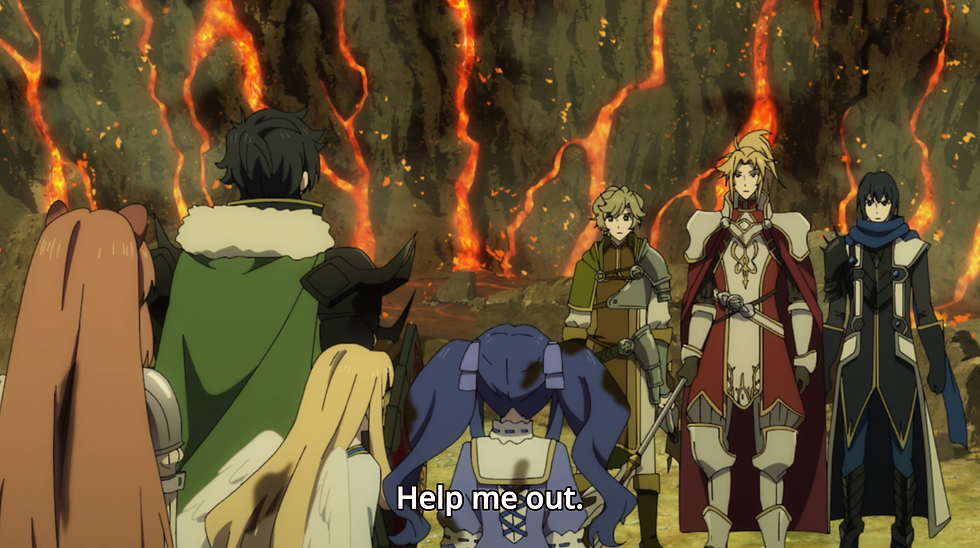
After all, it's never easy to forgive, let alone learn to cooperate with your old enemies.
Unfortunately, that kind of half-hearted praise is pretty much the summary of my feelings toward Shield Hero. While I might like some portions of what it has to offer, there's just as much to dislike about it. What's worse is that it's incredibly easy to get lost in the bad parts of this show simply because of how aggressive they are. The show's start is a perfect example of this very problem. While the suffering Naofumi goes through the start is eventually turned into a positive for the series as it helps him grow and later becomes something he has to learn to get over for the good of everyone else, it's hard to simply get over how abrasive and manipulative it is. Rape, as a general rule of thumb, is a topic that needs to be handled with care due to how traumatic it is for anyone who has dealt with it personally or tried to help someone else who has. Yet this series not only uses it poorly but turns to a mentality of victim-blaming that is even more dangerous. While it might be clear that Malty is scum for leveling false accusations of rape against Naofumi, that kind of representation seems to forget that many people who have been raped are often discredited with claims that they made it up to get attention. Now, just because I criticize it doesn't mean I believe that the series intended to tow that particular line of thought that "rape victims are frauds that want attention" or that "all women are liars," but that is the feeling it gave off to many and made the show instantly unwatchable to others.
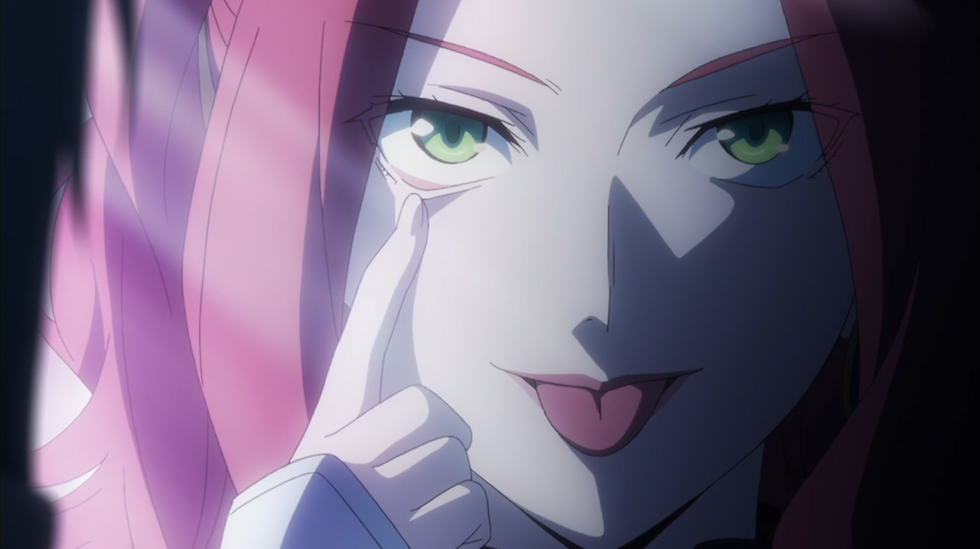
Lord knows I was more than a little tempted to drop this series with a righteous fury.
For a mildly less extreme example, the same kind of half-hearted praise can be leveled at a large portion of the show's main cast--the female portion. Part of my issues with the female cast members can be directed to the portrayal of women in isekai in general but it's something of an aggravated issue in Shield Hero. I am, of course, referring to the show's use of slavery as a problem-solver for many issues but there's more to it than that. On top of slavery being used turned into something bordering on romantic in Raphtalia's case, the rest of Naofumi's party suffer the same kind of one-sided obsession with Naofumi and come with their own series of issues. In Raphtalia's case, there are actually two issues to contend with. The first is the issue is that her slave brand adds a lot of moral issues and questions regarding her free will to an already problematic romance. The second is that, while the series starts with Raphtalia being a young child, she is quickly and conveniently aged up thanks to demi-human's ability to rapidly age in proportion to their level. So, on top of the slavery issue, Raphtalia is still, technically, underage. For her part, Filo, the literally months-old chocobo/angel-girl, is played as both a daughter and potential romantic interest for Naofumi. Despite being the person who raised her, Filo makes her romantic intentions known thanks to her frequent, blunt statement that she wishes to "mate" with Naofumi. Blessedly, young princess Melty is mostly free of these problems but the series does still go out of its way to suggest that she isn't entirely against the idea.
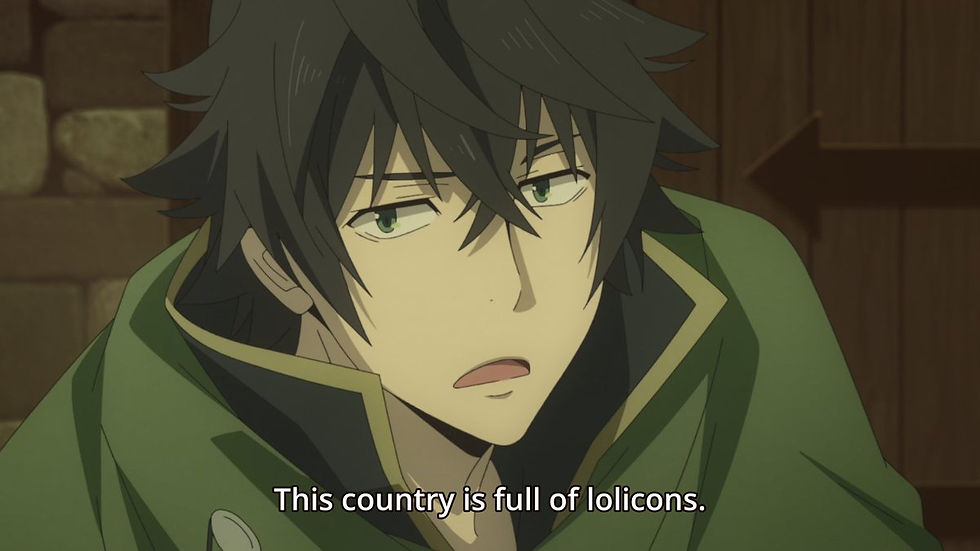
Did you notice the trend with Naofumi's party? Yeah, the show's not exactly subtle about it.
So, like I said, the best I can really ever offer Shield Hero are statements following a pattern of "It's good but..." that always ends with me feeling disappointed. For example, it's good but the series goes out of its way to be edgy and unreasonably offensive. It's good but the show's otherwise powerful female cast regularly become catty doormats thanks to the series' harem overtones. It's good but the good aspects barely manage to outweigh all of the show's terrible concepts, themes, and running issues. In other words, as much as I like this series, it forces me to always be on my back foot whenever I want to defend it or recommend it to someone else. So, again, the best I reasonably do is say that this show is good but, no matter how entertaining it is, entertainment value can't save a series that falls to pieces the second you stop to actually think about it. However, if you managed to read through my praises and problems with this series but don't think they'll be a problem, then, by all means, give it a shot. As far as isekai go, Shield Hero definitely isn't the worst show you could watch. If you felt yourself getting triggered as I listed my complaints or just couldn't bring yourself to care one way or another, then it just isn't worth your time. It might not be the worst but it definitely isn't the best either.


Comments